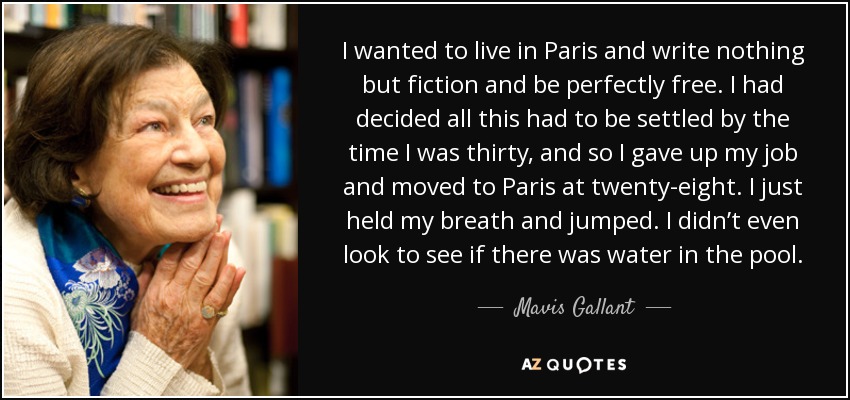"A short story is what you see when you look out of the window."
Mavis Gallant
April 11, 1922 - Montreal
1950 - moves to Paris
September 1, 1951- publishes, in The New Yorker, her first short story. She would publish 116 stories in The New Yorker.
February 18, 2014 - passes away in her beloved Paris
Katherine Mansfield set a number of her short stories on trains, with women talking to men they never met, opening up to a stranger they knew they would never see again. "Up North" is such a story. Set around 1946 or so, when Gallant must've been dreaming about leaving Canada, the woman is the English war bride of a Canadian soldier, she is with her son who barely remembers his father. They are headed Abitibi, in northern Quebec to join her husband who drives a bull doxer for an aluminum company. We never learn how she came to marry a Canadian soldier or anything at all about her life in England. Gallant is a master at using small details to illuminate the past and see into the future:
"He looked all at once ridiculous and dishonored in his cheap English clothes –the little jacket, the Tweedledum cap on his head. He outdistanced his clothes; he was better than they were. But he was rushing on this train into an existence where his clothes would be too good for him."
The woman hates the train berth. She begins a conversation with a man sitting near her and her son. We learn her husband is a laborer. Her son has never heard anyone speak French and in an intriguing aspect of the story mistakes a group of Frenchmen for elves. Her son asks the man if he has ever seen a ghost. No he has not but where the boy is going he will find lots of Indians, who do see ghosts.
I think in Quebec in 1946 the expression "up North" was more than just a location,it means an almost wild west kind of place far from civilization in Montreal, and light years from London. If the woman thought the train was shabby wait until she gets to Abitibi and takes up the life of a mining camp wife.
We leave the story worrying for the future of the woman but more so her son. His father seems a bit of a brute.
We also wonder about the future of the man on the train.
Do you have some favorite set on a train short stories?
Mel u






3 comments:
As you have intuited, "up north" does have broader connotations and not only in Quebec, but in a relative sense. I remember telling a friend a couple of decades ago that I was going "north" for a weekend away (living further south in Canada than I do now, only slightly) and she was a little offended that I called my destination north, as it was nowhere near her idea of north (which was Thunder Bay), but she admitted that if others (particularly indigenous peoples) heard her refer to Thunder Bay as north, then they would be the ones with noses out of joint considering Thunder Bay southerly. So it goes both ways: northerners disparage southerners for their raucous city ways and southerners disparage northerners for their version of uncivilized life. All random and subjective, of course. :)
PS Great quotes about writing!
Buried In Print.thanks for this comment. Many countries have given special meanings to different areas
Post a Comment